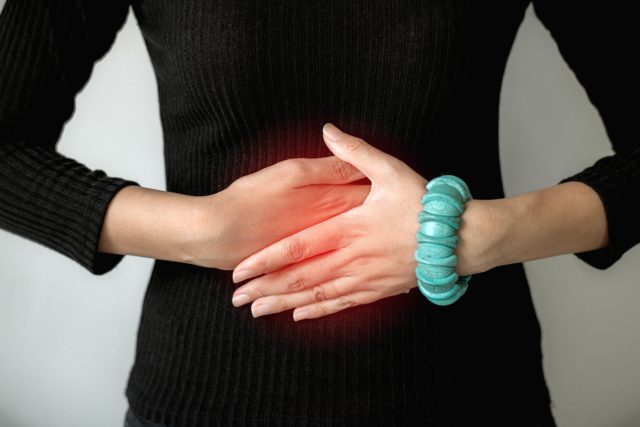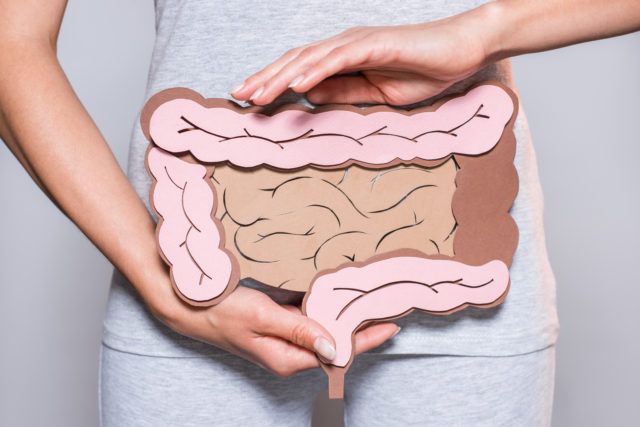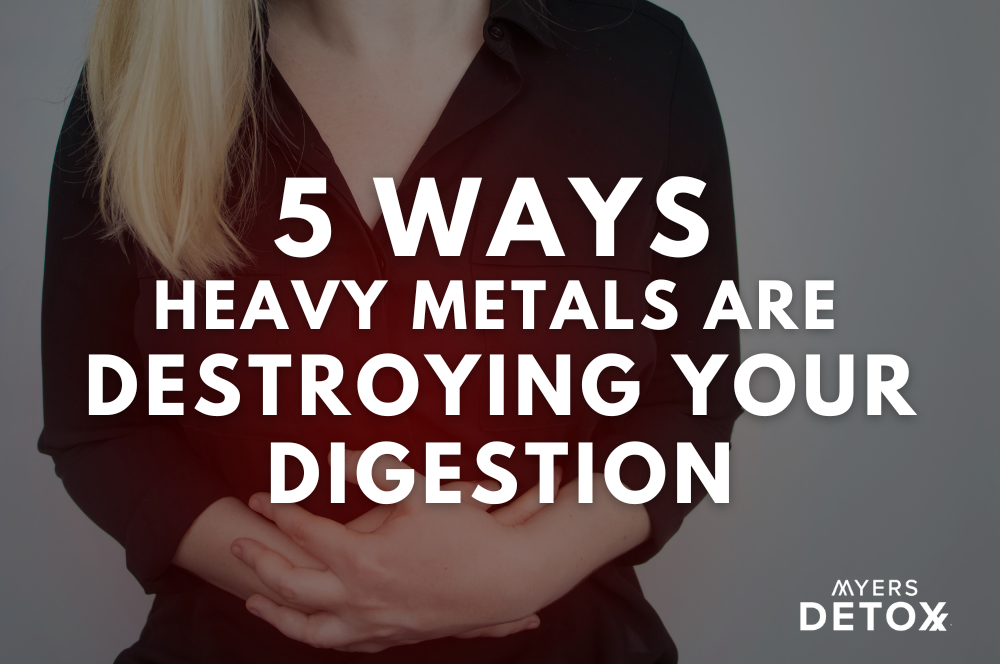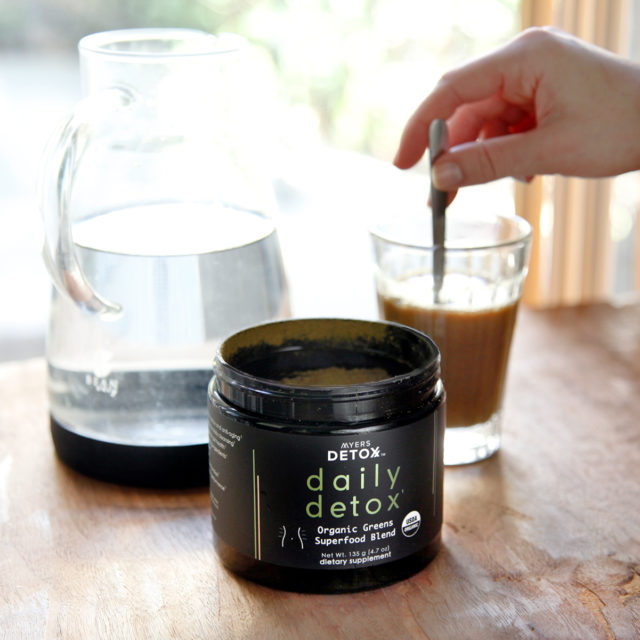How is your digestion? It’s estimated that around 20 million Americans suffer from some type of digestive disease or disturbance, which is a staggering number, to say the least[1].
Your digestive health is directly correlated to the health of every other system in your body – without healthy movement in your digestive tract, your body can’t receive the nutrients it needs to thrive.
So what gives? Why are so many people struggling with irritable bowel, Inflammatory Bowel Disease, constipation, diarrhea, bloating, and so on?
While there are many potential culprits, one that is often overlooked is heavy metals.
In this article, you’ll learn:
- How heavy metals shift your gut microbiome and create dysbiosis
- The vital organ that’s the first to become compromised from heavy metal insult inside your body
- Why the integrity of your gut lining is so crucial, and how heavy metals create “leaky gut”
- The ways in which heavy metals damage enzymes and create havoc in your gut
- The one thing you can do each day to assist with gut health and detox at the same time
Digestion As Your First Line Of Defense
Maintaining the health of your digestion is vital for protecting your body against unwanted compounds, toxins, and microbes. Why? Because your digestive tract is one of your first lines of defense, standing between your internal anatomy and the outside world.
While your skin can protect you from the elements and potential intruders, your digestive tract serves as a hearty defense system for anything you ingest (either intentionally or unintentionally). Inside your gut, you have enzymes, digestive fluids, and microbes that work in concert to help you break down and absorb food while also killing off and dismantling anything that doesn’t belong.
Unfortunately, your digestive powers can only do so much. When you become bombarded with toxins, your internal defenses can break down, resulting in poor digestion and toxic buildup in your cells and tissues.
Of all the toxins in the environment, heavy metals are some of the most dangerous and ubiquitous – making them a double threat to your health.
5 Ways Heavy Metals Are Destroying Your Digestion

There are several ways metals can interfere with healthy digestion, including:
- Interfering with your microbial balance
- Damaging your liver health
- Interfering with digestive enzyme production and function
- Destroying your gut lining
Let’s look at each of these in more depth.
#1 Microbiome
Research into the microbiome continues to reveal the vast responsibilities that your little gut bugs have in keeping you happy and healthy. Your gut microbiome not only impacts the health of your digestion, but its activities affect the function and well-being of your entire body.
For example, just a handful of activities that your microbiome is involved in include[2][3]:
- Drug metabolism
- Nutrient breakdown and absorption
- Maintenance of the gut mucosal barrier
- Production of vitamins
- Immunomodulation
- Communication between the gut and the brain
- And so much more
While your gut bacteria are multifunctional, they’re also quite vulnerable to changes in your internal environment. This is especially the case when you ingest toxic compounds like heavy metals.
As you might imagine, the delicate balance of your microflora can be thrown off when heavy metals enter the scene. In fact, research shows that heavy metals act like antibiotics in your gut, killing off healthy bacteria and destroying the balance that your body requires to keep all of the above activities flowing seamlessly[4][5].
Unfortunately, the downstream impact of impaired microflora can impact nearly every system in your body.
Some ways in which heavy metals interfere with your microbiome include
- Studies show that mercury and copper exposure can lead to reduced numbers of beneficial bacteria (Lactobacilli & Bifidobacter), while increasing harmful bacteria like E.coli[14][15].
- Copper and mercury are also responsible for fueling the overgrowth of yeasts (e.g. Candida) and commensal bacteria e.g. Citrobacter, alpha and gamma-hemolytic streptococci, and hemolytic E.coli[16][17]
- Lead, cadmium, and mercury may lead to the overgrowth of parasitic organisms such as Blastocystis hominis, Entamoeba, Dientamoeba, Cryptosporidium[18]
- Heavy metals, in general, can lead to the overgrowth of pathogenic bacteria like Pseudomonas, Campylobacter, Klebsiella, Clostridia Comment end[19].
As you can see, heavy metals create havoc in your microbiome, and if you already have a microbial imbalance (which many of us do), metal exposure will only exacerbate it.
#2 Liver Health
Your liver has over 500 different functions in your body, and although it’s not a part of your alimentary canal, it plays a crucial role in digestion.
Specifically, your liver produces bile sent to your digestive tract to help emulsify and break down fat. Furthermore, once nutrients are absorbed into your circulation, they are sent to your liver to be processed. From here, they can be packaged and transported throughout your body to be used as fuel, or building blocks for new cells, tissues, enzymes, and so on.
In this way, the healthy function of your liver not only ensures the proper breakdown of nutrients, but is also intimately involved with your body’s ability to utilize the nutrients you consume.
When heavy metals get past your digestive tract and enter circulation, they also get sent to your liver for processing, just like other nutrients. Unfortunately, while your liver may be able to detoxify some of the metals it receives, studies show that when your liver is overwhelmed, the metals can become toxic to your liver cells[6].
This can result in hepatotoxicity, which may lead to liver damage, and ultimately impaired liver function[7].
#3 Digestive Enzymes
Another way that heavy metals can interfere with digestion is through their interaction with digestive enzymes[8].
Digestive enzymes have the vital role of breaking down macromolecules into smaller units so they can be absorbed by your gut and enter circulation. Fat, protein, and carbohydrates all rely on digestive enzymes to be dismantled and utilized by your body for fuel and as building blocks.
When heavy metals in your gut interact with digestive enzymes, it impairs their function and can ultimately lead to a host of issues and potential dietary sensitivities.
While researchers aren’t exactly sure how heavy metals interfere with enzymes, some theories include[9][10]:
- Inhibition of the enzyme-substrate complex (interferes with their ability to connect with the macromolecules)
- Denaturation (breakdown) of the protein within the enzyme
- Interference with microbe’s ability to synthesize enzymes
- Changes in enzyme structure, and, therefore function
- Downregulation of digestive enzyme encoding genes
That said, studies show that mercury and lead can cause inhibition of gastric HCL, and reduce the synthesis of pepsin. HCL and pepsin are crucial for the breakdown of protein in your digestive tract, and when proteins aren’t properly broken down it can create digestive issues as well as potential autoimmune reactions if you already have a leaky gut[20][21].
Furthermore, research shows that cadmium exposure, in particular, may be damaging to gut health because exposure to this heavy metal can reduce the production of the pancreatic and brush border enzymes chymotrypsin and enterokinase[22]. Chymotrypsin is a vital enzyme for protein metabolism, and enterokinase is essential for activating a cascade of enzymes that work throughout the lining of your gut[23].
#4 Gut Lining
The integrity of your gut lining is crucial for keeping unwanted compounds out of your internal circulation. It’s the lining of your gut that ultimately blocks molecules from entering your circulation or allows them to pass.
In the case of nutrients, cells in your gut lining (called epithelial cells) are programmed to allow nutrients to pass through once they’ve been broken down into small enough units.
Unfortunately, as heavy metals try to make their way into your body, they come into contact with epithelial cells and create irritation and inflammation in the protective layer. Over time metal exposure can damage these cells, which in turn allows the heavy metals to work their way into your body.
What’s more, the inflammation and damage caused by heavy metals can create “leaks” in the tight junctions in your gut lining. These junctions are put in place to keep your gut lining secure, but when they become leaky (as in “leaky gut), they can allow substances through that don’t belong – like heavy metals[11].
Leaky gut is associated with a range of health issues, including inflammatory bowel disease, celiac disease, and other autoimmune conditions like Hashimoto’s thyroiditis, autoimmune hepatitis, type 1 diabetes (T1D), multiple sclerosis, and lupus [12][13].
#5 Absorption
Heavy metals are particularly toxic to your mitochondria, the powerhouse of your cell. Mitochondria are responsible for energy production, and therefore are necessary for your cells to carry out all of their functions – including absorption.
Studies show that the effect of heavy metals on the cells in your gut can impair mitochondrial function and lead to malabsorption of several nutrients, minerals, and amino acids due to impaired energy supply[24][25].
How To Protect Your Gut From Heavy Metals

Avoiding heavy metals in your diet and water supply is obviously the most straightforward way to mitigate the impact they have on your body. Unfortunately, avoiding heavy metals is much easier said than done.
Even if you eat a clean diet and drink only filtered water, heavy metals are everywhere these days, and there is no escaping them.
Luckily, there are things you can do to reduce the impact they have on your health while also enhancing your body’s ability to detoxify them out of your system.
So, how do you protect your gut from heavy metal toxicity?
First, you want to ensure that your digestive tract is receiving the nutrients it needs to stay happy and healthy. When heavy metals show up, they’ll have a lot harder time creating chaos if your microbiome is balanced and your digestion is strong.
Second, you’ll want to be sure that you’re giving your body the nutrients it needs to optimize detoxification. This includes liver support, as well as metabolic and digestive support.
I know as well as anyone how challenging it can be to try to get all of the nutrients you need from diet alone. Even if we all had the time to cook three fresh meals daily, our soil is not what it used to be, so our healthiest dishes are often still lacking some nutrients.
That’s why I created Daily Detox. This nutrient-rich powder comes packed with superfoods and botanicals that are research-backed to support healthy digestion, detox, metabolism, aging, and immunity.
Specifically, Daily Detox is a powerhouse for revving up liver activity, and therefore assisting your body in its detoxification processes. The nutrients in Daily Detox are hand-picked to give your liver all of the assets it needs for both phase one and phase two detoxification – which means toxins are not only pulled from your cells, but they’re also safely escorted out of your body without causing any more harm.
Most of the detox supplements on the shelves today only support partial detox, which can actually cause more harm than good. When your body is only supported in removing toxins from cells, and not from your body, they end up in your blood and then re-lodging elsewhere.
The nutrients in Daily Detox will assist your natural detox pathways by enhancing the flow and activity of your livers functions for seamless detoxification of heavy metals as well as other unwanted compounds that are draining your energy and digestive health.
With just one scoop of Daily Detox in the morning, you can feel good about the support you’re giving your body to not only reduce heavy metal toxicity but also to support the health of your digestion and microbiome.
Takeaway
Heavy metals are one of the sneakiest environmental toxins because they can show up in unexpected places, and at this point, they’re pretty much everywhere in our natural and unnatural environment.
Once they enter your body, heavy metals can interfere with your digestive enzymes, irritate and create leaks in your gut barrier, inhibit proper bile flow via your liver, and destroy the balance of your microbiome. While all of this is devastating to your digestive system, the downstream effects can impact every system in your body.
Choosing high-quality foods and always drinking filtered water is crucial, but if you want to protect your gut from heavy metals, you really need a supplement like Daily Detox. I like to think of it as a fail-safe; it provides you with a foundation of nutrients that can help your body to maintain optimal function in the face of modern toxicity and stressors.
*These statements have not been reviewed by the FDA. Daily Detox is a dietary supplement that is not intended to diagnose, treat, cure, or prevent any disease. Please talk to your doctor before beginning any new supplement regimen.










